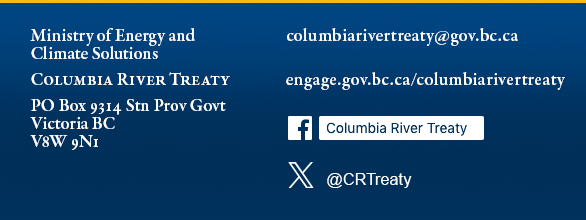Columbia River Treaty
Edition: April 2023

Encouraging advancements for Columbia River Treaty negotiations
Apr 5, 2023

Koocanusa Reservoir
The past year has seen an encouraging shift in discussions between Canada and the U.S. about modernizing the Columbia River Treaty.
When reflecting on activities in 2022, Katrine Conroy, Minister Responsible for the Columbia River Treaty, described “the most promising advancements since discussions about the Treaty’s future began in 2018.” Minister Conroy was referring to substantial progress made over three formal rounds of negotiation meetings and a series of technical sessions that kept Canadian and American negotiators busy throughout the year.
Three months into 2023, they show no signs of slowing down. The negotiating teams met in Vancouver, B.C., on January 25 and 26 and, following a series of intersessional meetings, reconvened for the 16th round of negotiations on March 22 and 23 in Washington D.C.
The countries have now exchanged several proposals outlining what a modernized Treaty might include, and are working hard to find common ground. Conversations have been constructive and, at times, challenging, as both sides strive to meet the needs of their respective regions. They are advancing views on hydropower co-ordination and flood-risk management and are moving closer to alignment on aspects of ecosystem co-operation, flexibility for how Canada operates its Treaty dams, and collaborative engagement on Libby Dam operations.
Flexibility is especially important to the Canadian negotiating team, which includes Canada, B.C. and the Ktunaxa, Secwepemc and Syilx Okanagan Nations. It would allow B.C. to adjust Treaty operations to enhance ecosystems and Indigenous cultural values, adapt to the impacts of climate change, and address social and economic interests. Canada’s Negotiation Advisory Team is examining different ways of operating the dams to meet these goals while continuing the Treaty’s original purpose of increasing power generation and preventing damaging floods. To inform these discussions, Indigenous Nations are leading research to develop objectives for ecosystems and Indigenous cultural values, and the Columbia River Treaty Local Governments Committee is developing objectives for socio-economic interests.
While there is no deadline for modernizing the Treaty, Canada, B.C., and Indigenous Nations remain committed to working with the U.S. to reach a fair agreement that shares benefits equitably between countries.
“Although there are still outstanding issues to be resolved,” Minister Conroy said in a statement following the January round of talks, “there is cause for optimism as the negotiating teams move closer to a consensus on some of the main issues. Canada and the U.S. are working together to reach an agreement-in-principle that will protect and support people in the Columbia River Basin and the region’s ecosystems.”
Before any agreement on a modernized Treaty is finalized, the Province will engage with Basin residents to explain what is being proposed and provide the opportunity for feedback. While there is currently no timeline for when that could happen, what’s certain is that 2023 is shaping up to be another busy year at the Columbia River Treaty negotiating table.


